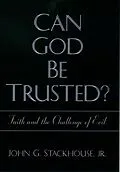In a world riddled with disappointment, malice, and tragedy, what rationale do we have for believing in a benevolent God? If God is all-powerful and all-loving, why is there so much evil in the world? John Stackhouse takes a historically informed approach to this dilemma, examining what philosophers and theologians have said on the subject and offering reassuring answers for thoughtful readers. Stackhouse explores how great thinkers have grappled with the problem of evil--from the Buddha, Confucius, Augustine, and David Hume to Martin Luther, C. S. Lewis, and Alvin Plantinga. Without brushing aside the serious contradictions posed by a God who allows incurable diseases, natural disasters, and senseless crimes to bring misery into our lives, Stackhouse asks if a world completely without evil is what we truly want. Would a life without suffering be a meaningful life? Could free will exist if we were able to choose only good? Stackhouse examines what the best minds have had to say on these questions and boldly affirms that the benefits of evil, in fact, outweigh the costs. Finally, he points to Christian revelation--which promises the transformation of suffering into joy--as the best guide to God's
Autorentext
John G. Stackhouse, Jr., is Professor of Religious Studies at Crandall University in New Brunswick, Canada.
